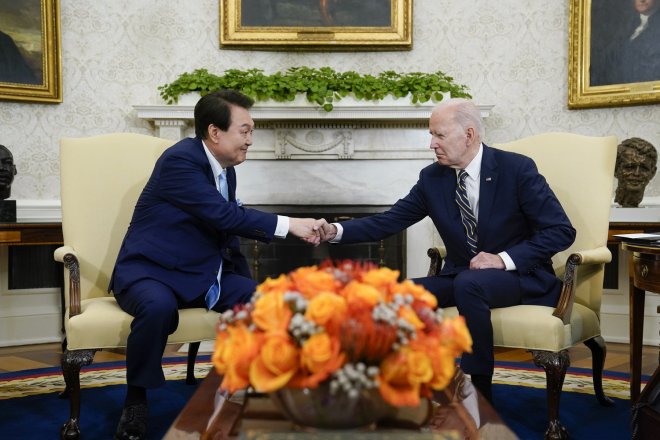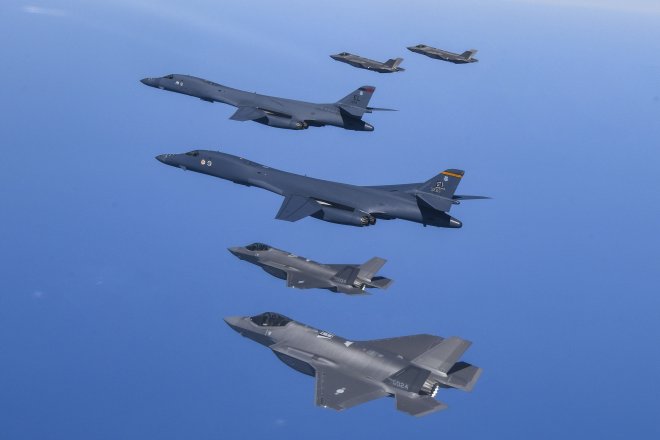
When U.S. President Joe Biden declared last week that any use of nuclear weapons against the United States or its allies will result in the “end” of the North Korean regime, the sister of supreme leader Kim Jong Un dismissed the remarks as the ramblings of an “old man with no future.”
Biden’s comments came after a summit with South Korean President Yoon Suk Yeol on April 26 during which the two leaders signed a “Washington Declaration” that committed to strengthening mutual defense agreements amid continued North Korean missile tests.
Their meeting received broad coverage in the North Korean media, including news that the United States would temporarily deploy nuclear submarines to South Korea for the first time in decades.
Kim Yo Jong, who is also a high-ranking official in her brother’s regime, penned an article that appeared on the website of the state-run Korea Central News Agency or KCNA.
“The ‘Washington Declaration’ fabricated by the U.S. and south Korean authorities is a typical product of their extreme anti-DPRK hostile policy reflecting the most hostile and aggressive will of action,” she said.
KCNA intentionally doesn’t capitalize “South” when referring to its southern rival in English.
“Another thing that we cannot let pass nor overlook is the fact that the chief executive of the enemy state officially and personally used the word ‘the end of regime’ under the eyes of the world,” she said. “Would we simply regard it as the man’s senility?”
 U.S. Air Force B-1B bombers
U.S. Air Force B-1B bombers
“Young college students and intellectuals are paying close attention to the announcement of the U.S. president, who warned that North Korea would see the end of its regime if it used nuclear weapons,” said a source in the northwestern province of North Pyongan on condition of anonymity for security reasons.
The summit is now a hot topic among young people, said another source from Pyongsong, in South Pyongan province, who insisted on not being identified.
“There are intellectuals and university students even saying that they are glad that the presidents of the U.S. and South Korea warned the regime,” he said. “South Korean and international news is published on pages four and five of the [state-run] Rodong Sinmun [newspaper], and young people as well as intellectuals are reading with interest,” he said.
The ‘puppet traitor’
North Korean state media, however, portrayed the meeting as a humiliation for South Korea and Yoon, who was described as a “puppet traitor.”
“Some have said that of all the "governments" in south Korea"s history, the Yoon administration may be the least independent-minded toward the U.S., and this visit to the U.S. undoubtedly confirms this evaluation,” the report said.
It went on to say that the “international community” – apparently a reference to China and Russia – is worried that the agreements made at the summit are ratcheting up tensions on the Korean peninsula and destabilizing the region.
Kim Yo Jong said the decision to send American nuclear submarines gave Pyongyang all the more determination to enhance its “nuclear war deterrent.”
“The more the enemies are dead set on staging nuclear war exercises, and the more nuclear assets they deploy in the vicinity of the Korean peninsula, the stronger the exercise of our right to self-defense will become in direct proportion to them,” she said.
‘Reacting sensitively’
The U.S. deployment of strategic nuclear assets in Korea may be more aggressive than Pyongyang was expecting, said Cho Han Bum, a senior researcher at Korea Institute for National Unification.
“[North Korea] seems to be reacting very sensitively to the response of South Korea and the United States, which surpasses and offsets North Korea’s nuclear deterrence,” said Cho.
Other South Korea-based experts anticipate that North Korea will continue to display their capabilities of using its nuclear weapons as a preemptive strike under the pretext of the Washington Declaration.
But many North Koreans are fed up with the Kim dynasty and his preoccupation with a nuclear program while many struggle to put food on the table, sources inside the country said.
“People don’t speak openly, but it’s not only the young people. Deep inside, many residents are glad with the Washington Declaration,” the Pyonsong source said.
“It’s because they have a grudge against the reality of this country, where every day you wake up and sigh because you’re worrying about where to find your next meal.”
Translated by Claire Shinyoung Oh Lee and Leejin J. Chung. Written in English by Eugene Whong. Edited by Malcolm Foster.